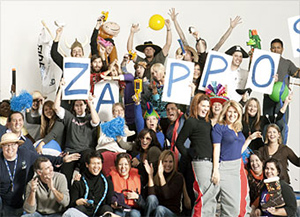
Company culture helps you to identify the “way you and your team are doing things,” to find out what your core values are and to figure out what kind of people you need on your team. But, even if your company culture is unique other companies may use a similar pattern to give some spirit to their organizations. These similarities are creating specific company culture types.
Why should you know what your company culture type is? First of all, because it provides a valuable insight and a better understanding of your team's inner workings, relationships, and challenges. And second of all, because it's fun!
You will like our typology - besides serious names, we have managed to find superhero counterpart for each culture model. So, let's see what superhero crew (or individual) is your company?
Basic Culture, or the Avengers culture

Just like Avengers, who are equal and none of them is the leader, this company culture type doesn’t recognize the boss. In fact, there are no any titles in this kind of organization. It is an excellent fit to early stage startups where you just want to have a team of superheroes who know what they should do at every moment, with no need to tell them.
Such teams usually count up to ten people, who are all on the same page and understand each other quite well. A few of them are company founders, but they are not emphasizing their role. They are also doing absolutely everything, just like any other team member.
In an organization like this, a customer is supreme God, and everyone will do anything just to make them happy. This is quite logical because such startups need every customer that they can get to be able to grow.
Even if such working environment may seem very attractive, it is very challenging to keep it in the same form when the number of employees starts to rise. It is impossible to have no structure once you reach the number of 50 employees. At a certain point, such companies will need some more rigid rules, some leadership, and accountability. This is the stage when the next level of culture will make or break the company.
One of the excellent examples of this kind of culture (besides probably every young startup you know) is Basecamp. They are giving their best to keep up with this image. They have even cut some parts of their business to remain small. But, Basecamp is one in a million, and it actually takes a lot of effort and guts to keep up with the Avengers company culture once you start growing. So, kudos to Basecamp!
Team-oriented culture, or the Fantastic Four culture
You have probably noticed that unlike Avengers, Fantastic Four have a leader (yes, it is Reed Richards) who is taking care for the rest of the team. Team-oriented culture has the category of the leader. In this case, the leader is not the boss. It is someone who is a mentor, facilitator, and who knows what the company is doing and where they are headed.
Fantastic Four culture is quite a friendly one. In such organizations, people have a lot in common, because they are hired based on a cultural fit, not their skills and expertise. These companies are taking care of team satisfaction and happiness. In return, they are getting a loyal and dedicated team who is willing to go the extra mile for the general benefit.
Values that drives this kind of teams are usually quality teamwork, equal participation, commitment to the shared principles, open communication, growth, and development of the team.
 One of the main difficulties that threaten to this type of the culture is also rapid growth. Unless a company has a clear and defined employment strategy, it can end up with a few rotten tomatoes which can affect the entire organization. To prevent that leaders must have strict procedures when choosing new team members.
One of the main difficulties that threaten to this type of the culture is also rapid growth. Unless a company has a clear and defined employment strategy, it can end up with a few rotten tomatoes which can affect the entire organization. To prevent that leaders must have strict procedures when choosing new team members.
Companies who are the best examples of Fantastic Four culture type are Netflix and Zappos. If you have recognized your company culture type here, you can learn a lot from these guys.
Result-oriented, or Batman culture
Batman is not afraid to break the law to achieve a higher goal and get things done. Or, to say it differently, it doesn't matter how we did it, it’s important to have results. Yes, Batman doesn't have a team who works with him, but he is an excellent example of traits that this culture type has.

Moto of result-oriented organizations is “finish the work and get things done.” They are emphasizing winnings and end results. People who are the best fit for companies with this type of culture are competitive, quite focused, hardworking, and goal oriented. They enjoy working in an environment where they can compete and be the best.
Central values in result-oriented company culture are business reputation, visible and acknowledged success, high profits, all kinds of rewards and accomplishments. They are winning the market fast, but they can also quickly disappear if they are not careful enough.
Best examples of Batman culture organizations are the ones who are in the sales business, such as car dealerships, marketing agencies, fast food chains.
Individualistic, or X-Men culture
The reason why we're calling this type of culture X-Men is apparent: X-Men can work as a team, but each of them is unique and can save the day if necessary. An organization with such culture hires only the best, most confident and exceptional candidates who are superstars in their field.
Such teams are innovative and want to change the world on quite a large scale. They are producing a creative, dynamic and challenging environment where a person needs to strive and prove their quality all the time. But, the one thing that glues the team together is a competitive spirit, constant experiments, and high level of innovative components. It can be quite difficult for a person who is not competitive and used to work under pressure to fit into such an organization. But, for someone who is ambitious and willing to work and to rival the best, this is an excellent place to be.
Leaders of these companies are considered to be geniuses of our time. They are visionaries, risk takers, and first class entrepreneurs.

Some of the most famous companies who nurture X-men culture are Google and SpaceX. If you take them as an example, you can see the entire picture. They are indeed changing the world.
Traditional, or the Superman Culture
Superman is one of the most traditional and conservative superheroes - he is superhuman, with a steady job, raised in Kansas, lives in traditional marriage, has no vices. He is the kind of guy that everyone would want for a friend or a neighbor.

Superman traits can be applied to traditional company culture: they are structured, formalized, with defined hierarchy, transparent procedures, and different departments where everyone knows what their job is. All of these formal rules are keeping the organization together and enable it to work efficiently. The primary focus is on results and execution.
You can imagine, and old school corporation which is working this way, but don’t be deceived. Such organizations have changed in the last couple of years due to the impact of digital culture and a significant number of millennials on executive positions. As they did a few times in the past, such companies are evolving again and adjusting to the new trends.
Banks, big corporations, and multinational enterprises are examples of organizations with traditional, Superman company culture. Even if they have some quite strict rules, they have managed to keep up the pace and survive all kinds of changes in culture in the past 150 years. It will be the same this time because they are here to stay.
What is your company culture type?
Did you manage to recognize your company culture type? Maybe you saw some parts of your organization in a few different company culture types. It’s not unusual to have a mixture because company culture types are not a strict category. Anyway, we hope that you learn something new about your team and that you had some fun!
PS. We’re Fantastic Four, with more than four members :)
